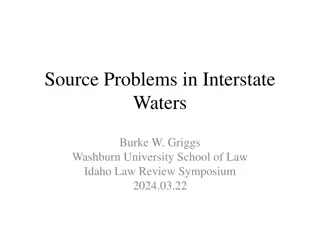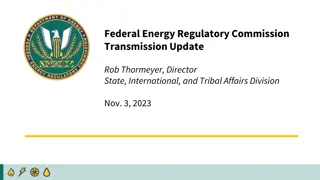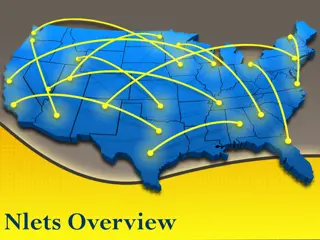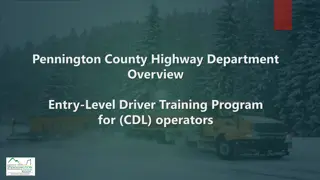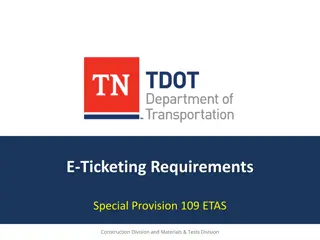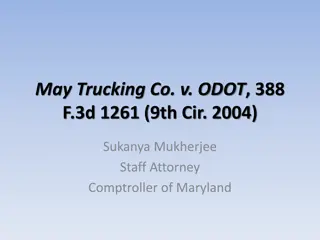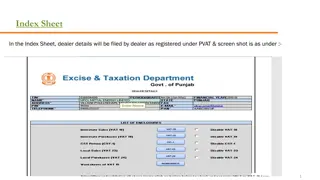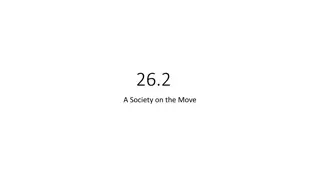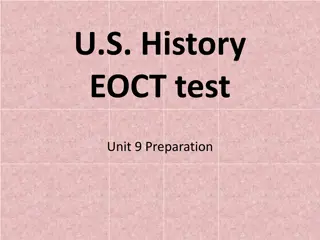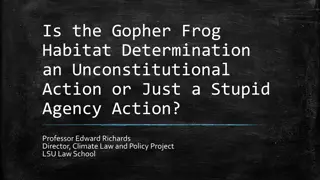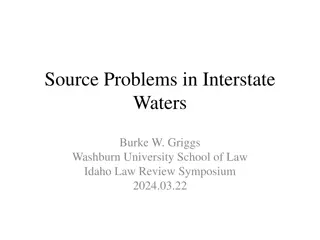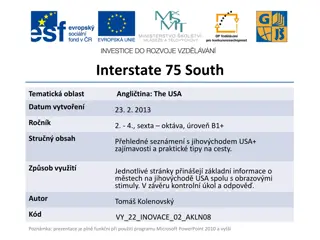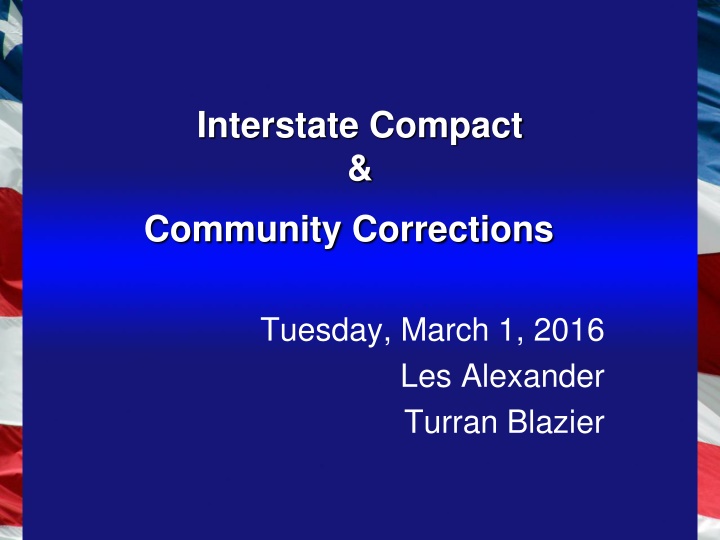
Interstate Compact and Community Corrections Oversight
The Interstate Compact facilitates the movement of offenders across state lines, overseen by the Interstate Commission. Its goals include uniform data collection, victim input, and compliance monitoring. Indiana operates under the Compact, with specific staff roles defined. Key definitions like Substantial Compliance and Resident are crucial for understanding the Compact's operations.
Download Presentation

Please find below an Image/Link to download the presentation.
The content on the website is provided AS IS for your information and personal use only. It may not be sold, licensed, or shared on other websites without obtaining consent from the author. If you encounter any issues during the download, it is possible that the publisher has removed the file from their server.
You are allowed to download the files provided on this website for personal or commercial use, subject to the condition that they are used lawfully. All files are the property of their respective owners.
The content on the website is provided AS IS for your information and personal use only. It may not be sold, licensed, or shared on other websites without obtaining consent from the author.
E N D
Presentation Transcript
Interstate Compact & Community Corrections Tuesday, March 1, 2016 Les Alexander Turran Blazier
Why do we have an Interstate compact? The Interstate Commission oversees the day-to-day oversight of the compact between the states. The Commission promulgates rules to achieve the goals of the compact, ensures an opportunity for input and timely notice to victims and to jurisdictions where defined offenders are authorized to travel or to relocate across state lines and will establish a system of uniform data collection, provide access to information on active cases by authorized criminal justice officials, and coordinate regular reporting of Compact activities to heads of state councils, state executive, judicial, and legislative branches and criminal justice administrators. The Commission will also monitor compliance with the rules governing interstate movement of offenders and initiate interventions to address and correct noncompliance and will coordinate training and education regarding regulations of interstate movement of offenders for officials involved in such activity.
Interstate Compact in Indiana Most states have Interstate Probation and Parole in the same office; Indiana is a bifurcated state
Indiana Compact Staff Jane Seigel Commissioner/ Compact Administrator Turran Blazier Deputy Compact Administrator - Probation Ronald Leffler; Deputy Compact Administrator - Parole Laura Hausladen Nita Wright Compact Specialists Probation Les Alexander Compact Specialist Parole
Compact Definitions Substantial Compliance - sufficiently in compliance with the terms and conditions of his or her supervision so as not to result in initiation of revocation of supervision proceedings by the sending state. Relocate - to remain in another state for more than 45 consecutive days in any 12 month period.
Resident - a person who (1) has continuously inhabited a state for at least 1 year prior to the commission of the offense for which the offender is under supervision; and (2) intends that such state shall be the person s principal place of residence; and (3) has not, unless incarcerated or on active military deployment, remained in another state or states for a continuous period of 6 months or more with the intent to establish a new principal place of residence.
Resident Family - a parent, grandparent, aunt, uncle, adult child, adult sibling, spouse, legal guardian, or step-parent who (1) has resided in the receiving state for 180 calendar days or longer as of the date of the transfer request; and (2) indicates willingness and ability to assist the offender as specified in the plan of supervision.
Retaking - the act of a sending state in physically removing an offender, or causing to have an offender removed, from a receiving state. Significant Violation - an offender s failure to comply with the terms or conditions of supervision that, if occurring in the receiving state, would result in a request for revocation of supervision.
Sex Offender - an adult placed under, or made subject to, supervision as the result of the commission of a criminal offense and released to the community under the jurisdiction of courts, paroling authorities, corrections, or other criminal justice agencies, and who is required to register as a sex offender either in the sending or receiving state and who is required to request transfer of supervision under the provisions of the Interstate Compact for Adult Offender Supervision.
Supervision - means the oversight exercised by authorities of a sending or receiving state over an offender for a period of time determined by a court or releasing authority, during which time the offender is required to report to or be monitored by supervising authorities, and to comply with regulations and conditions, other than monetary conditions, imposed on the offender at the time of the offender s release to the community or during the period of supervision in the community
Warrant - written order of the court or authorities of a sending or receiving state or other body of competent jurisdiction which is made on behalf of the state, or United States, issued pursuant to statute and/or rule and which commands law enforcement to arrest an offender. The warrant shall be entered in the National Crime Information Center (NCIC) Wanted Person File with a nationwide pick-up radius with no bond amount set
Types of Eligible Supervision Home Detention Day Reporting GPS Alcohol Monitoring Any other case that has conditions, under any type of community supervision Work Release is not eligible.
Eligible Offenders Must Transfer to Relocate Eligible Offenders All Felons Certain Misdemeanants (Rule 2.105) Next Slide Non-eligible Offenders Certain Misdemeanants (Rule 2.105) Deferred Sentences (Rule 2.106) Is there a finding of guilt? Has a plea been entered? Given up the right to trial? Those on work-release (Rule 2.107) Or released under furlough Or on a pre-parole program Those on a Pre-Trial Intervention Programs Offenders released on bail Unsupervised Offenders requiring monitoring Bench Probation
Eligible Misdemeanants Sentence = 1+ years of supervision AND Instant Offense includes one or more: Person incurred direct or threatened physical or psychological harm. 2nd or subsequent offense of driving while impaired by drugs or alcohol Use or possession of a firearm involved. Sex offense requiring registration in the sending state Rule 2.105
Eligibility for Transfer Part I: Nature of Offense Physical Harm? Firearm Offense? Eligible for Transfer Under ICAOS Depending On Sentence (See Part II) 2nd Offense DUI? Misdemeanor Sex Offense? Other Offenses Offense not Covered by ICAOS Infractions & Civil Offenses Type of Offense Probation Eligible for Transfer Under ICAOS Depending On Sentence (See Part II) Parole Felony Not Subject to ICAOS Unless Community Supervision Involved Flat Time
Eligibility for Transfer Part II: Sentencing/Supervision Considerations Sentence w/ Supervised Probation or Other Community-Based Supervision Eligible for Transfer Under ICAOS Deferred Sentencing (See Part III) Sentencing Outcome ICAOS Does Not Apply Sentence w/ no Probation or Formal Supervision
Eligibility for Transfer Part III Deferred Sentencing Considerations Defendant Admits Guilt; Court Accepts Plea but Defers Sentence & Final Judgment in lieu of Supervised Probation, Treatment, or Community Corrections Program Eligible for Transfer Under ICAOS Court Enters Final Judgment Of Guilt but Suspends Execution of Sentence in lieu of Supervised Probation, Treatment or Community Corrections Program Is it a Deferred Sentence Under ICAOS? Court Defers Entry of Judgment Or Execution of Sentence; Offender not Subject to Any Supervision Program ICAOS Does Not Apply
2 Types of Transfer ALL transfers are solely at discretion of the Sending State Mandatory Discretionary Receiving State has the discretion to accept or reject supervision Receiving State MUST accept supervision 90+ days supervision remaining Offenders not eligible for mandatory transfer Valid plan of supervision Sending state must justify WHY Substantial compliance Qualifying reason Resident of receiving state Resident family in receiving state Other reasons per Rule 3.101-1 Rule 3.101
Acceptance of Transfer by Receiving State, Felony Has Resident Family Who Will Support Supervision Plan? No No Resident of Receiving State? Acceptance Not Required; Discretionary Transfer Yes Yes Felony Offender with Three Months or More of Supervision Remaining and in Substantial Compliance In the Sending State Can Obtain Employment Or has Means of Support? Acceptance Required No Military Members Subject to Valid Orders of Deployment Yes Living with Family Military Members who are Subject to Valid Orders of Deployment No Employment Transfer of Family Member Can Obtain Employment Or has Means of Support? Employment Transfer of Offender
Acceptance of Transfer by Receiving State, Misdemeanor Has Resident Family Who Will Support Supervision Plan? No No Resident of Receiving State? Acceptance Not Required; Discretionary Transfer Yes Yes Misdemeanor Offender Convicted Of a Covered Offense & Subject To 1 Year or More of Supervision Can Obtain Employment Or has Visible Means of Support? No Acceptance Required Military Members Subject to Valid Orders of Deployment Yes Living with Family Military Members who are Subject to Valid Orders of Deployment Can Obtain Employment Or has Means of Support? No Employment Transfer of Family Member Employment Transfer of Offender
Reporting Instructions Reporting Instructions allow an offender to return to the receiving state as long as he lived there at the time of sentencing Mandatory Discretionary 48 hours Sex Offenders (5 days, can t leave without approval)
Transfer Request Must be completed within 15 days of approved reporting instructions Fee Court Approval All non-eligible cases fall under discretionary Compact Office approval required prior to collecting fee & submitting discretionary cases
Retaking vs. Extradition Offender Application for Transfer (Waiver of Extradition) MUST be signed PRIOR to leaving/transferring States party to this compact waive all legal requirements to extradition of offenders who are fugitives from justice. Rule 3.109 Retaking Extradition Fugitives are to be returned under the extradition clause of the constitution. (Article VI Section 2) The only way an offender can be returned to the sending state under the Compact is if he originally left the sending state through an approved transfer or reporting instructions under the compact.
Discretionary Retaking Sending State retains authority to retake at ANYTIME unless offender is charged with a new felony or violent crime in the receiving state. Offender charged with a new criminal offense cannot be retaken: until charges have been dismissed sentence has been satisfied offender released to supervision for new offense sending and receiving state mutually agree to retake/return Rule 5.101 & 5.101-1
Mandatory Retaking Rules 5.102, 5.103, 5.103-1 Receiving State requests retake &: Mandatory Retake? Sending State Action Report of 1-2 significant violations Respond with action/non-action to be taken No Issue warrant OR Order offender to return May ask for PC Hearing Report of 3rd significant violation Yes Conviction of new felony Yes Issue warrant Conviction of new violent crime Yes Issue warrant Absconder apprehended in receiving state on sending state s warrant Warrant previously issued per Rule 4.109-2 May ask for PC Hearing Yes
Retaking Responsibilities Sending State Cost of retaking No bail or other release conditions allowed for offender Retake within 30 calendar days Receiving State Cost of detaining No bail or other release conditions allowed for offender Conduct PC hearing if requested Morrisey vs. Brewer 408 U.S. 471 (1972) Gagnon vs. Scarpelli 411 U.S. 778 (1973) Establish authority of officers Identify the offender Ensure no detainers against offender exist Ensure no extradition proceedings are pending Offenders are entitled to a probable cause hearing: Close proximity to where the violations occurred An administrative hearing not to determine guilt/innocence and level of due process is less than that of a revocation hearing Conducted by a neutral and detached person Mini Training Available Rule 5.104, 5.105, 5.106, 5.107, 5.108, 5.110 & 5.111
Processing & Training Community Corrections 2 Users Create an account at www.interstatecompact.org Complete On-Demand Trainings ICAOS Course Library ICOTS Course Library Sign & Email User Agreement (Email to Turran) Review Compact Rules Probation Create an account at www.interstatecompact.org Complete On-Demand Trainings CC Staff ICAOS Course Library Review Compact Rules Must coordinate workflow with Probation
Contact Information If after completing today s training & online course libraries, you still have questions or require additional training, please contact: Turran Blazier 317-234-3601 turran.blazier@courts.in.gov


